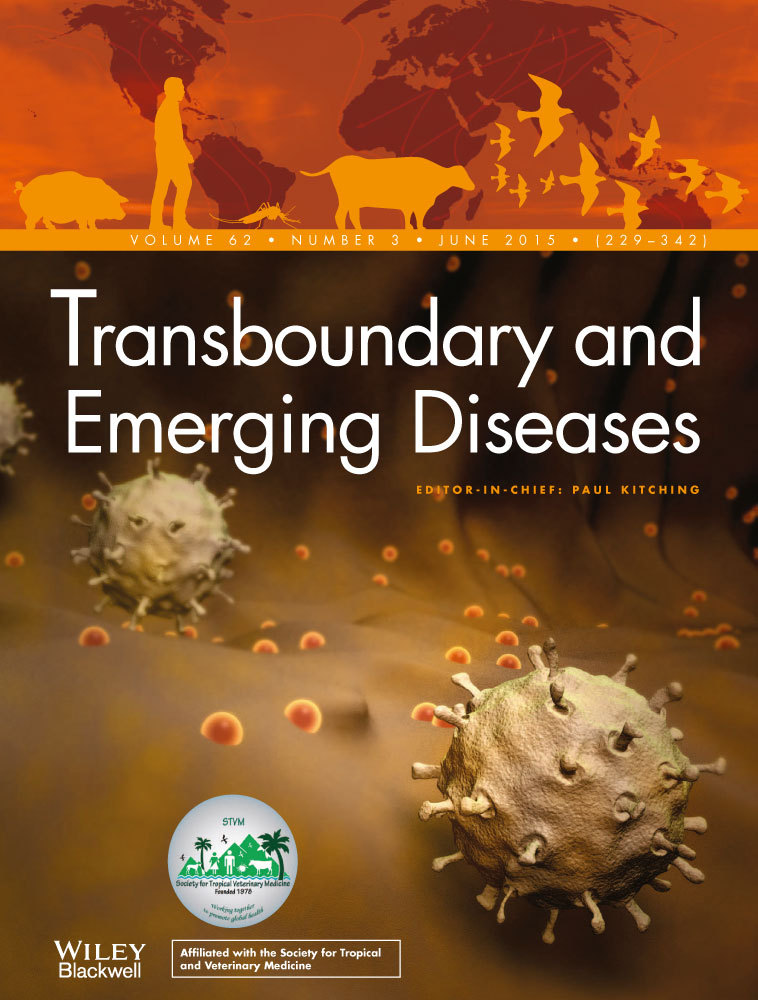Ver ítem
- xmlui.general.dspace_homeCentros e Institutos de InvestigaciónCICVyA. Centro de Investigación en Ciencias Veterinarias y AgronómicasInstituto de VirologíaArtículos científicosxmlui.ArtifactBrowser.ItemViewer.trail
- Inicio
- Centros e Institutos de Investigación
- CICVyA. Centro de Investigación en Ciencias Veterinarias y Agronómicas
- Instituto de Virología
- Artículos científicos
- Ver ítem
Heterogeneity in the antibody response to foot‐and‐mouth disease primo‐vaccinated calves
Resumen
Foot‐and‐mouth disease (FMD) vaccines are routinely used as effective control tools in large regions worldwide and to limit outbreaks during epidemics. Vaccine‐induced protection in cattle has been largely correlated with the FMD virus (FMDV)‐specific antibodies. Genetic control of cattle immune adaptive responses has been demonstrated only for peptide antigens derived from FMDV structural proteins. Here, we quantify the heterogeneity in the antibody
[ver mas...]
Foot‐and‐mouth disease (FMD) vaccines are routinely used as effective control tools in large regions worldwide and to limit outbreaks during epidemics. Vaccine‐induced protection in cattle has been largely correlated with the FMD virus (FMDV)‐specific antibodies. Genetic control of cattle immune adaptive responses has been demonstrated only for peptide antigens derived from FMDV structural proteins. Here, we quantify the heterogeneity in the antibody response of cattle primo‐vaccinated against FMD and study its association with the genetic background in Holstein and Jersey sires. A total of 377 FMDV‐seronegative calves (122 and 255 calves from 16 and 15 Holstein and Jersey sires, respectively) were included in the study. Samples were taken the day prior to primo‐vaccination and 45 days post‐vaccination (dpv). Animals received commercial tetravalent FMD single emulsion oil vaccines formulated with inactivated FMDV. Total FMDV‐specific antibody responses were studied against three viral strains included in the vaccine, and antibody titres were determined by liquid‐phase blocking ELISA. Three linear hierarchical mixed regression models, one for each strain, were formulated to assess the heterogeneity in the immune responses to vaccination. The dependent variables were the antibody titres induced against each FMDV strain at 45 dpv, whereas sire's ‘breed’ was included as a fixed effect, ‘sire’ was included as a random effect, and ‘farm’ was considered as a hierarchical factor to account for lack of independence of within herd measurements. A significant association was found between anti‐FMDV antibody responses and sire's breed, with lower immune responses found in the Jersey sires’ offspring compared with those from Holstein sires. No significant intrabreed variation was detected. In addition, farm management practices were similar in this study, and results of the serological assays were shown to be repeatable. It therefore seems plausible that differences in the immune response may be expected in the event of a mass vaccination campaigns.
[Cerrar]

Autor
Di Giacomo, Sebastián;
Brito, Barbara Patricia;
Perez, A.M.;
Bucafusco, Danilo;
Pega, Juan Franco;
Rodríguez, L.;
Borca, Manuel Victor;
Perez Filgueira, Daniel Mariano;
Fuente
Transboundary and emerging diseases 62 (3) : 280-287. (June 2015)
Fecha
2015-06
ISSN
1865-1674
1865-1682
1865-1682
Formato
pdf
Tipo de documento
artículo
Palabras Claves
Derechos de acceso
Restringido
 Excepto donde se diga explicitamente, este item se publica bajo la siguiente descripción: Creative Commons Attribution-NonCommercial-ShareAlike 2.5 Unported (CC BY-NC-SA 2.5)
Excepto donde se diga explicitamente, este item se publica bajo la siguiente descripción: Creative Commons Attribution-NonCommercial-ShareAlike 2.5 Unported (CC BY-NC-SA 2.5)

